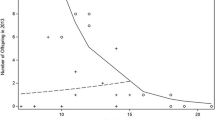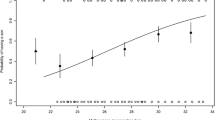Summary
Paternity determination by oligonucleotide fingerprinting confirms that maternal rank affects the reproductive success of male Barbary macaques (Macaca sylvanus). High-born males began to reproduce significantly earlier and sired significantly more infants surviving to at least 1 year of age during the first 4 years of their reproductive career than low-born males. This relation was independent of the natal/non-natal status of the males, and was not affected by external conditions such as the level of intrasexual competition or the number of fertilizable females. Since high-ranking females in this population produced significantly more male offspring than low-ranking females, the data on sex ratio adjustment and comparative breeding success of sons and daughters are consistent with the predictions of the Trivers-Willard hypothesis.
Similar content being viewed by others
Reference
Ali S, Müller CR, Epplen JT (1986) DNA fingerprinting by oligonucleotide probes specific for simple repeats. Hum Genet 74:239–243
Arnemann J, Schmidtke J, Epplen JT, Kuhn HJ, Kaumanns W (1989) DNA fingerprinting for paternity and maternity in “group O” rhesus monkeys at the German Primate Center. Results from a pilot study. Puerto Rico Health Sci J 8:181–184
Berard JD (1989) Life histories of male Cayo Santiago macaques. Puerto Rico Health Sci J 8:61–64
Charnov EL (1982) The theory of sex allocation. Princeton University Press, Princeton
Clark AB (1978) Sex ratio and local resource competition in a prosimian primate. Science 201:163–165
Clutton-Brock TH, Albon SD (1982) Parental investment in male and female offspring in mammals. In: King's College Sociobiology Group (ed) Current problems in sociobiology. Cambridge University Press, Cambridge, pp 223–247
Clutton-Brock TH, Iason GR (1986) Sex ratio variation in mammals. Q Rev Biol 61:339–374
Clutton-Brock TH, Albon SD, Guinness FE (1984) Maternal dominance, breeding success and birth sex ratios in red deer. Nature 308:358–360
Curie-Cohen M, Yoshihara D, Luttrell L, Benforado K, MacCluer JW, Stone WH (1983) The effects of dominance on mating behavior and paternity in a captive troop of rhesus monkeys (Macaca mulatta). Am J Primatol 5:127–138
Epplen JT, Ammer H, Epplen C, Kammerbauer C, Mitreiter R, Roewer L, Schwaiger W, Steimle V, Zischler H, Albert E, Andreas A, Beyermann B, Meyer W, Buitkamp J, Nanda I, Schmid M, Nürnberg P, Pena SDJ, Pöche H, Sprecher W, Schartl M, Weising K, Yassouridis A (1991) Oligonucleotide fingerprinting using simple repeat motifs: a convenient, ubiquitously applicable method to detect hypervariability for multiple purposes. In: Burke T, Dolf G, Jeffreys AJ, Wolff R (eds) DNA fingerprinting: approaches and applications. Birkhäuser, Basel, pp 50–69
Hrdy SB (1987) Sex-biased parental investment among primates and other mammals: a critical evaluation of the Trivers-Willard hypothesis. In: Gelles R, Lancaster J (eds) Child abuse and neglect: biosocial mechanisms. Aldine, New York, pp 97–147
Hrdy SB (1988) Levels of complexity in the study of “adaptive” sex ratios. In: Greenberg G, Tobach E (eds) Evolution of social behavior and integrative levels. Lawrence Erlbaum, Hillsdale New York, pp 147–163
Kuester J, Paul A, Arnemann J (1992) Paternity determination by oligonucleotide DNA fingerprinting in Barbary macaques (Macaca sylvanus). In: Martin RD, Dixson AF, Wickings EJ (eds) Paternity in primates. Genetic Theories and tests. Karger, Basel, pp 141–154
Meikle DB, Vessey SH (1988) Maternal dominance rank and lifetime survivorship of male and female rhesus monkeys. Behav Ecol Sociobiol 22:379–383
Meikle DB, Tilford BL, Vessey SH (1984) Dominance rank, secondary sex ratio and reproduction of offspring in polygnous primates. Am Nat 124:173–188
Noë R, Sluijter AA (1990) Reproductive tactics of male savanna baboons. Behaviour 113:117–170
Paul A, Kuester J (1985) Intergroup transfer and incest avoidance in semifree-ranging Barbary macaques (Macaca sylvanus) at Salem. Am J Primatol 8:317–322
Paul A, Kuester J (1987) Sex ratio adjustment in a seasonally breeding primate species: evidence from the Barbary macaque population at Affenberg Salem. Ethology 74:117–132
Paul A, Kuester J (1988) Life history patterns of semifree-ranging Barbary macaques (Macaca sylvanus) at Affenberg Salem. In: Fa JE, Southwick CH (eds) Ecology and behavior of food-enhanced primate groups. A Liss, New York, pp 199–228
Paul A, Kuester J (1990) Adaptive significance of sex ratio adjustment in semifree-ranging Barbary macaques (Macaca sylvanus) at Salem. Behav Ecol Sociobiol 27:287–293
Sade DS (1967) Determinants of dominance in a group of free-ranging rhesus monkeys. In: Altman S (ed) Social communication among primates. University of Chicago Press, Chicago, pp 99–114
Saunders C, Hausfater G (1978) Sexual selection in baboons (Papio cynocephalus): A computer simulation of differential reproduction with respect to dominance rank in males. In: Chivers DJ, Herbert J (eds) Recent Advances in Primatology, vol 1, Behaviour. Academic Press, New York, pp 567–571
Schaik CP van, Hrdy SB (1991) Maternal rank and sex ratios at birth in monkeys: Local resource competition vs. the Trivers Willard effect. Am Nat 138:1555–1562
Shively D, Smith DG (1985) Social status and reproductive success of male Macaca fascicularis. Am J Primatol 9:129–135
Sibly R, Calow P (1986) Why breeding earlier is always worthwhile. J Theor Biol 123:311–319
Silk JB (1983) Local resource competition and facultative adjustment of sex ratios in relation to competitive abilities. Am Nat 121:56–66
Small ME, Hrdy SB (1986) Secondary sex ratios by maternal rank, parity, and age in captive rhesus macaques (Macaca mulatta). Am J Primatol 11:359–365
Smith DG, Smith S (1988) Parental rank and reproductive success of natal rhesus males. Anim Behav 36:554–562
Stern BR, Smith DG (1984) Sexual behaviour and paternity in three captive groups of rhesus monkeys (Macaca mulatta). Anim Behav 32:23–32
Sugiyama Y (1976) Life history of male Japanese monkeys. In: Rosenblatt JS, Hinde RA, Shaw E, Beer C (eds) Advances in the study of behaviour, vol 7. Academic Press, New York, pp 255–284
Trivers RL, Willard DE (1973) Natural selection of parental ability to vary the sex ratio of offspring. Science 179:90–92
Vessey SH, Meikle DB, Drickamer LC (1989) Demographic and descriptive studies at La Parguera, Puerto Rico. Puerto Rico Health Sci J 8:121–127
Author information
Authors and Affiliations
Additional information
Offprint requests to: A. Paul
Rights and permissions
About this article
Cite this article
Kuesterl, A.P., Arnemann, J. Maternal rank affects reproductive success of male Barbary macaques (Macaca sylvanus): evidence from DNA fingerprinting. Behav Ecol Sociobiol 30, 337–341 (1992). https://doi.org/10.1007/BF00170600
Received:
Accepted:
Issue Date:
DOI: https://doi.org/10.1007/BF00170600




